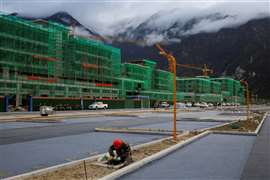China attempts to curb public-private partnership projects amid rising debts
14 November 2023
 Image: Reuters
Image: Reuters
China has ordered its local governments to halt public-private partnership projects identified as “problematic” and replaced a 10% budget spending allowance for these ventures with a vetting mechanism by Beijing as it tries to curb municipal debt risks.
The guidelines were mentioned in a cabinet document that was circulated among local governments, policy banks and state lenders last month, said the two sources with knowledge of the matter. The latest guidelines have not been reported previously.
The State Council has issued detailed guidelines to reform the public-private partnership (PPP) model for the first time since its launch in 2014, and comes as worries grow about the impact of ballooning local government debt on the economy.
Local government debt reached 92 trillion yuan ($12.6 trillion), or 76% of China’s economic output in 2022, up from 62.2% in 2019, according to the latest data from the International Monetary Fund.
In an effort to constrain the accumulation of further debt, Beijing will eliminate a regulation allowing local governments to earmark up to 10% of their annual public budget expenditures toward these projects, the sources said.
The 10% expenditure threshold will now be replaced with government authorities’ review of each PPP project, they said. The move comes after numerous local governments’ PPP expenditure hit the upper limit of the threshold in recent years.
The State Council also asked the local governments to halt “problematic projects”, identified in inspections conducted by the National Audit Office (NAO) earlier this year, and address the identified issues, said the sources.
Projects designated as “problematic” are those riddled with irregularities including in which local government financing vehicles (LGFVs) posed as the “private” partner, spurring excessive debt accumulation, one of the sources said.
In addition to those measures, all PPP projects that have not finished bidding process to find partners by February this year will have to be suspended, said the two sources, who have direct knowledge of the State Council document.
Since 2014, Beijing has promoted a PPP model to channel private money into public infrastructure projects, to increase capital investment while easing the burden on heavily-indebted local governments.
But the PPP boom has alarmed authorities who say some local governments have used public-private partnerships, government investment funds and government procurement services as “disguised channels” for raising debt.
Both the sources declined to be named due to sensitivity of the matter.
The State Council and the NAO did not immediately respond to Reuters requests for comments.
Debt-laden local governments represent a major risk to the Chinese economy and its financial stability, economists say, amid a deepening property crisis, years of over-investment in infrastructure and huge bills to contain the Covid-19 pandemic.
A portion of the $12.6 trillion local government debt is linked to the PPP projects, as municipalities used these infrastructure-building initiatives as a conduit to raise capital.
As of the end-2022, China had implemented more than 14,000 PPP projects with the value of investment worth 20.9 trillion yuan ($2.87 trillion), or roughly the size of France’s economy, according to a research note by Bank of China.




